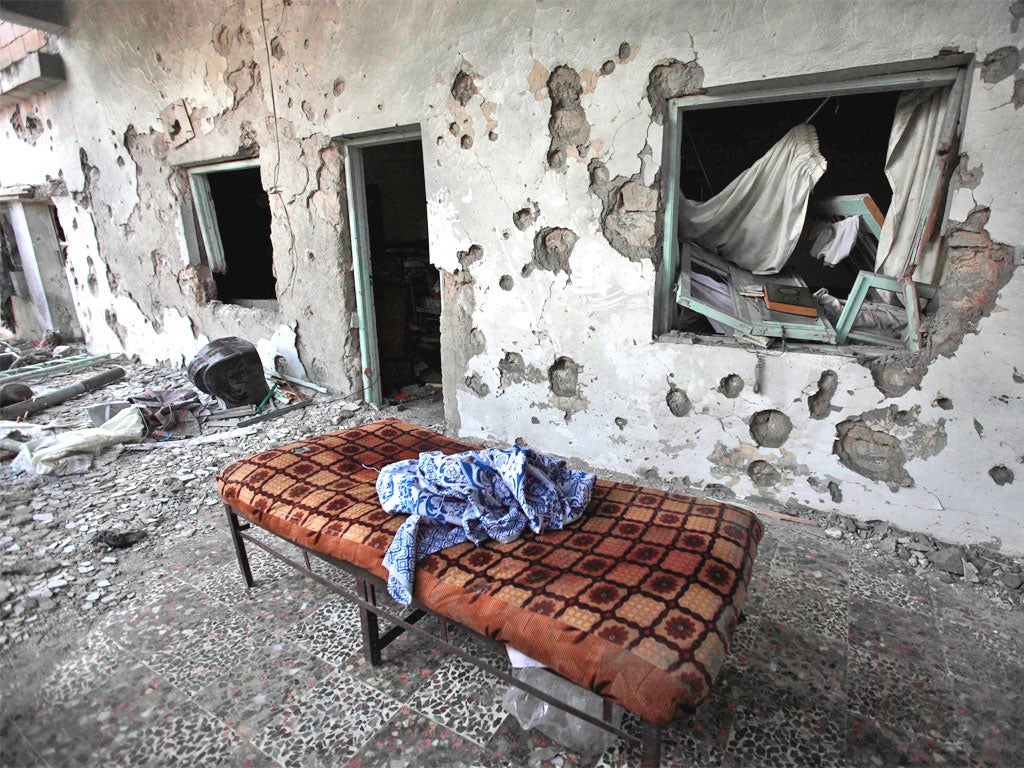The siege-breakers who provide a lifeline in the province of death
Kim Sengupta meets a young boy in Idlib Province

The farmer had serious injuries to his legs sustained in one of the minefields recently laid along the border by forces of the Syrian regime. He was steadily losing blood and unlikely to survive without urgent medical attention. The only way of getting this treatment was by reaching Turkey through a difficult and dangerous smugglers' route.
Murad al-Baidi's journey was by car and a tractor as well as being carried on a makeshift stretcher. It was during the last stretch, crossing a river, that the old and narrow wooden boat he was on suddenly tilted and he fell into the water. Amid shouts of alarm, Issa Mohammed was the first to act, diving into the swirling Orentes to grab the drowning man and then, with the help of others, drag him to safety.
Mr Mohammed, 20, is among a group in Idlib Province who are keeping a vital lifeline flowing amid the vicious strife. They take in supplies, food, medicine and, at times, ammunition, and then bring out the wounded to the edge of the frontier from where the Turkish authorities take them to hospitals in Antakya.
Sometimes the routes are blocked off by the Syrian military or, as happened recently, bad weather conditions. This means lost lives and hasty burials at the hillside as it is often too problematic to take the patients back to their home villages. Mr Mohammed went on the regime's wanted list after he rejected a call-up for the army. He has not joined the rebel fighters but wanted to help the revolution in other ways. Abdul Haq, the commander for the area, said: "It is better that he keeps doing what he does. We have had too many young men killed already. As you can see we haven't even got enough guns to go around for all our warriors and the ones we have are old. When we have proper weapons we can start recruiting again."
Mr Mohammed said: "I did not have to think about what to do when that man dropped from the boat. I am a strong swimmer and I knew that I would be able to get to him. It was difficult to hold on and the water was very, very cold. The injured man was not very old, otherwise he could have died. We got him into Turkey. We know the routes and so it was not too bad to move around here. But now the soldiers have a lot of checkpoints. Also the landmines are problems. We can see them putting in the mines and try to remember where they are, but, it means we have to try new paths and that makes this risky."
The rescuers are currently trying to get around a dozen injured out of the Jabal al-Zawiyah area where regime forces have been carrying out operations. Commander Haq said: "Each time we try to send a team there, they come under attack. In the past we have had some communi-cations with the soldiers and they have sometimes allowed people who have been hurt to be taken out if they were civilians. But now they have sent some different soldiers, and these men are much more brutal. They are the ones doing a lot of the killings and you cannot deal with them. But the good thing is that because they are not from this area they do not have knowledge [of this area] and so they are finding it very difficult to find us."
As well as transporting goods and people, the local volunteers are a vital source of information for the rebel fighters whose own freedom of movement has been restricted by army checkpoints and patrols. Yusuf, 22, in the rescue team, who did not want his family name mentioned, said: "We don't carry guns and many of us are not actually wanted by the government, so we can go into the villages and take messages and find out what they need.
"It is better we do this because if the soldiers find revolutionaries going to the villages they could open fire or go in and punish the people. We don't want people around here to suffer any more than they are doing already."
Join our commenting forum
Join thought-provoking conversations, follow other Independent readers and see their replies
Comments
Bookmark popover
Removed from bookmarks